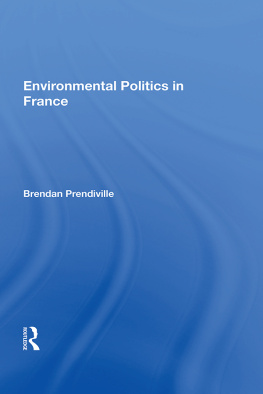Environmental Politics in France
First published 1994 by Westview Press
Published 2018 by Routledge
52 Vanderbilt Avenue, New York, NY 10017
2 Park Square, Milton Park, Abingdon, Oxon OX14 4RN
Routledge is an imprint of the Taylor & Francis Group, an informa business
Copyright 1994 by Taylor & Francis
All rights reserved. No part of this book may be reprinted or reproduced or utilised in any form or by any electronic, mechanical, or other means, now known or hereafter invented, including photocopying and recording, or in any information storage or retrieval system, without permission in writing from the publishers.
Notice:
Product or corporate names may be trademarks or registered trademarks, and are used only for identification and explanation without intent to infringe.
Library of Congress Cataloging-in-Publication Data
Prendiville, Brendan
Environmental politics in France / by Brendan Prendiville.
p. cm.
ISBN 0-8133-8822-8
Includes bibliographical references and index.
1. EnvironmentalismFranceHistory. 2. Environmental policy
FranceHistory. I. Title.
GE199.F8P74 1994
363.700944dc20
94-16017
CIP
ISBN 13: 978-0-367-01673-9 (hbk)
To my mother and in memory of my father
Were all green now was the title the well-known journalist R. Cans gave to his recent book (Cans 1992). Environmentalism in France is in fashion and everybody wants a piece of the action. Industry uses it as a sales pitch (e.g. Peugeot promised to plant a tree in the region of Brittany for every car they sold in 1992) and politicians of all sides have understood its vote-catching appeal.
In the field of science, the environment has been a research interest for some time. Ren Dumont (agronomist) has been warning the West of the state of third world countries since the 1930s and is already a living legend among French environmentalists. In Sociology, Alain Touraine studied the anti-nuclear movement in 1980 (Touraine 1980) and Edgar Morin has popularized the notion that we need to environmentalize our thinking and to forge a new paradigm of the environment (Morin 1990, 1993). In Philosophy, Cornelius Castoriadis traced an ecological path in 1981 (Castoriadis and Cohn-Bendit 1981), Michel Serres drew up the Natural Contract in 1990 (Serres 1990) and, recently, Luc Ferry asked some daunting questions about the New Ecological Order (Ferry 1992).
So, are we marching towards greater awareness of the links between social and natural problems? Or will environmentalism fade away like exhaust fumes in the wind?
Brendan Prendiville
When books are being written, life goes on. My first thoughts at the end of this exercise are, therefore, for Babeth.
My thanks also go out to Rebecca Donnellan, Fiona OConnell and Dominic Fitzgerald for their precious corrections and comments. On the technical side, without the help of the Ecole Nationale Suprieure des Tlcommunications de Bretagne in Rennes, France, this endeavour would have been even more arduous. I would, in particular, like to thank Jolle Le Bruno, Patrice Conil and Patrick Pondaven for their patient help and advice at crucial moments. Finally, a special thanks goes to Armelle Cavret for her help and encouragement over the years.
B. P.
Environmental politics in France, as elsewhere, is an attempt to balance out the relationship between human beings and nature. To bring man (and woman) back down to earth, as it were. To take him off his cultural pedestal and plunge him back into a natural world of which he has always been an integral part:
Mankind has to stop acting like a kind of Gengis Khan of the solar suburbs and consider himself not as a shepherd of life, but as a copilot of Nature. (Morin 1990:92)
Human beings are social beings. Banal as this statement may be in Sociology, it is fundamental to any understanding of human activity. At the beginning of the industrial era, the French sociologist, Emile Durkheim, expressed concern about the weakening of social relationships and the dangers of individualism. We will never know how he would have judged todays increasingly atomised Western society but his initial concerns were not far removed from those of contemporary environmentalists who wish to rebuild the social and natural environments. Why rebuild? Firstly, because over the last twenty-five years the natural environment has begun to show signs of wear and tear due to pollution. Secondly, because the social environment is becoming increasingly divided into first and second class citizens who make up the dual society; i.e. those who are integrated into society and those, increasingly numerous, who are excluded from it (e.g. homeless, jobless etc.). Environmental politics in France is about making the links between (natural) pollution and (social) exclusion. How much emphasis is given to the natural or social side of the environmental coin depends on the period and the militants themselves, as we shall see.
This book will draw a picture of environmental politics in France; from what was seen as a vast social movement (Simonnet 1979: 121) to what has become an electoral force. We will do this by studying four of its facets: its history, political culture, ideology and social base and typology. We will trace the path of French environmentalism and the obstacles it has encountered from the beginning of the 1970s to the early 1990s; two decades of extra-parliamentary activism, of political organisation, electioneering and ideological frenzy. These two decades have witnessed many changes both in the nature of the environmental movement and the society of which it is a part. Both aspects will be considered.
In , we will show how environmental politics has evolved from a nebulous mass into two political structures (Les Verts and Gnration Ecologie) struggling for a place in political society. In order to facilitate understanding of this evolution, we will refer at times to the two axes of the environmental movement. The vertical axis concerns political society (i.e. institutional politics) and the horizontal axis involves the extra- institutional activity within civil society. The scope of the horizontal axis is very wide as it can range from active participation in an anti-nuclear campaign to tending an organic garden plot. Environmentalists also meet other social actors within this axis who have similar aims (e.g. associations, third world activists, regionalists etc.) and distinguishing the different parts is not always easy. The two axes are, of course, a purely theoretical construction as the two constantly overlap in practice. We shall see, however, that during the two decades in question, one has alternately dominated the other and we shall attempt to explain why.
natural issues indistinguishable. In this second chapter we will begin to see why.
concerns environmental ideology. To be more precise, the different sources of the environmental belief system will be analyzed in this chapter. Few movements enjoy being labelled as ideological and environmentalism is no exception. Despite this semantic reticence however, there is, of course, an ideological content to the environmentalists belief system and we shall see that it stretches from the extreme-left to the extreme- right. Just how long it can retain such ideological breadth is an open question but such diversity goes some way to explaining the conflict which has often been visible between activists.










